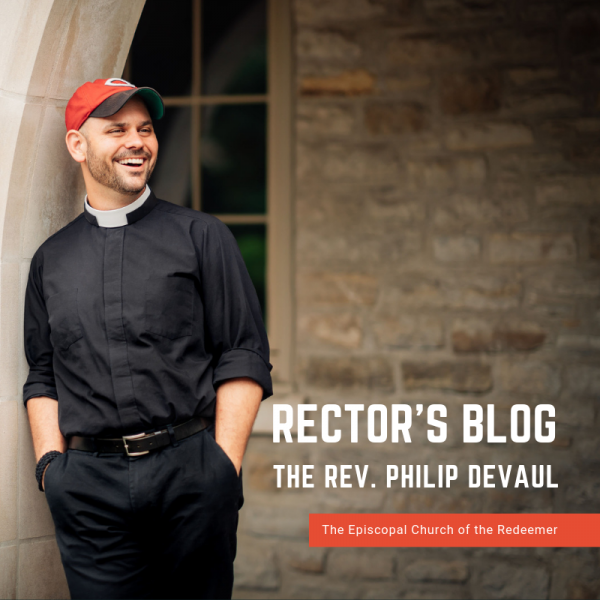Rector's Blog Summer Throwback Series: We Don't Talk About Abortion

Editor's note: As part of our When Love Shows Up Throwback Series we are re-posting this blog post which was originally posted on May 20, 2022.
The prevailing narrative in our country is that Christianity and abortion rights are incompatible with each other. This narrative exists despite the fact that, outside of White evangelical protestants, the majority of Christians in America support a person’s right to terminate a pregnancy. This also despite the fact that the majority of people who terminate a pregnancy identify as Christian. But the narrative persists that Christians oppose abortion. And it persists so strongly that many Christians who believe in reproductive rights end up thinking that their beliefs are inherently at odds with their religion – even when they are not. And there’s a reason this false narrative continues.
We don’t talk about abortion.
We Christians who support reproductive rights are mostly silent. We may not be silent individually. Some of us may work at Planned Parenthood. Some of us may vote for candidates and resolutions in favor of reproductive rights. Some of us may attend rallies. But as Christian communities, we are mostly silent. Some of us may stand up and speak out for abortion rights, but we don’t do it in Jesus’ name.
And we should. We who belong to Christian communities and support abortion rights should be speaking up in Jesus’ name.
But instead, we choose not to talk about abortion. In part, this is because of how you felt when you read the word abortion on a church blog just now. Many of us try to avoid making people feel that way. We often steer clear of hot button topics, and there is no hotter button in American culture than abortion.
During particularly polarizing times such as these, there is something attractive about creating spaces that do not broach sensitive topics. Having a church that doesn’t talk about controversial issues gives some of us a sense of respite from the endless cacophony of opinion out there in the real world. Some of us may think to ourselves that we need a community that acts as a timeout, an escape from those things that keep us up at night.
My first instinct is to defend my own silence. I can hear myself justifying my own avoidance by saying I want us to have a place where we are allowed to feel comfortable and safe being ourselves. After all, I believe that God loves us unconditionally as we are – and I have a desire for our community to reflect that belief.
The problem with this thinking is that many of the people in our community don’t actually feel safe. The women, transgender, and intersex people among us, for instance, are in a seemingly endless battle for autonomy over their own bodies. They live in a different country than I do. The country in which I live protects – and has always protected - my decisions regarding my body, my property, my agency. People who are not White like me, male like me, cisgender like me – they cannot say the same thing. Should they feel safe? Are they? And do I have any business feeling comfortable when they cannot?
We do not want to talk about abortion. We do not want to talk about abortion rights.
But the Christians who are successfully undermining abortion rights are not silent.
Today, we have questions to which we must be accountable:
Where are the Christians who will support bodily autonomy for all people?
Where are the Christians who will stand in solidarity and compassion with the people who have been put into the anguishing decision of terminating a pregnancy?
Where are the Christians who will speak clearly in Jesus’ name on behalf of those whose agency is called constantly called into question, whose dignity, whose very personhood is seen as contingent rather than inherent?
What kind of Christians will we be?
In 1967, the governing body of The Episcopal Church approved a resolution that included this statement: “The Episcopal Church express its unequivocal opposition to any legislation on the part of the national or state governments which would abridge or deny the right of individuals to reach informed decisions (on the termination of pregnancy) and to act upon them.” To put it simply, this means that this denomination has been formally and vocally in support of reproductive rights for 55 years. This is not new. This is not a shift in our shared belief. And yet we remain silent.
Here is why our silence is dangerous: When we stay silent, we lend strength to that inaccurate prevailing narrative. Our silence allows Christian people who terminate a pregnancy to believe their church does not support them. Our silence perpetuates the false impression that believing in reproductive rights is counter to the Christian faith. Meanwhile our very own faith tradition has stood in support of those rights, of the agency and equality of pregnant people, for over half a century.
Jesus comforts the afflicted. Jesus cares for those in deep pain and brings their concerns up in front of the comfortable to jostle us out of our convenient silence. Jesus tells us all that how we deal with those who are suffering is how we deal with Jesus himself. We cannot ignore Jesus in order to make church feel easier for some of us.
We are a Christian church that supports the right to an abortion. We should speak and act and live as if this is true, in Jesus’ name.
Tags: Rector's Blog